- Home
- Laura Resnick
A Wilder Name Page 4
A Wilder Name Read online
Page 4
“And the rest is history?”
“No, the rest is a lot of hard work.” They were drinking their coffee now. “I toured for a while. Then wrote another album, rehearsed, recorded it, and toured to promote it. And then another and then another.”
“So why aren’t you out touring to promote your new album?”
“I’ve been touring. And I’ll go out west for more concerts in a while.”
“We must be crazy.” Their eyes met and they laughed. Neither of them would do anything else.
When the bill came Luke’s eyes nearly popped. “I think I’ll have to go record another album,” he groaned.
“It was your idea to buy me dinner at a restaurant of my choice,” Nina reminded him evilly.
“Next time I want to apologize, I’ll cook you dinner.”
“You cook?”
“I do everything, Miss Gnagnarelli.”
Luke paid their bill and helped her into her coat. “Did you wear this foul thing just to annoy me?” he asked.
Nina laughed ruefully. “Partly, yes,” she admitted. “But I also think it’s beautiful. Be honest, it is, isn’t it?”
His gaze was like a caress, and a slow smile spread across his face. “You look beautiful,” he said simply.
Nina glanced about for a taxi. Luke suggested they walk. It was a beautiful night, crisp and windy, invigorating without being too cold. Nina agreed. Her hand slipped naturally into his. They walked up Fifth Avenue, on the far side of the street from the park.
“So what does it mean: A Wilder Name?”
“Buy the album and find out.”
“And if I don’t like it?”
“I’ll give you a refund. You’re just vicious enough to ask for one.”
“I’ll bet you’re sorry I wasn’t mugged the other night.”
“God, no. I hate to think of where we would have eaten tonight if you had been mugged.”
“How did your date go last night?”
“All right.”
“Anyone I know?”
“Aside from a sax player, who do we know in common?”
They walked in silence for a while.
“Where did it all come from?” Luke asked.
“All what?”
“The Italian shoes, the tailored clothes, the manners, the accent.”
“Oh, different places. I learned languages studying singing and working with Europeans. Other things I learned through exposure. Opera is by and large an elegant world. But to be honest, my husband taught me a lot and gave me the desire to learn more.”
“Your husband?” He stopped so fast Nina stumbled.
“My ex-husband, I should say. We were divorced three years ago.”
They continued walking.
“When were you married?”
“When I was twenty-two, in San Francisco. I met him soon after I began work. His name was Philippe Garnier. He came from a wealthy French family that put a lot of money into opera and were, consequentially, very influential.”
“Go on,” Luke said.
“He was thirty-seven, very suave, very handsome in a continental way. I thought I was in love with him, which is perhaps the same thing as love.”
“Do you really think so?”
“I don’t know anymore. Anyhow, he swept me off my feet. Which wasn’t hard to do with a girl who’d never been anywhere else but New York and had always been too busy working to have much to do with men. We were married about six months later.
“His family didn’t like my background but were happy he’d married someone they all believed would be a star someday. He set about molding me, and I—” she laughed without humor “—I was very malleable. He taught me how to dress, how to do my face, how to do my hair, what books to read, what wine to drink. He taught me elegant manners and elegant French. He encouraged me to drop what was left of my Brooklyn accent. I learned about art and antiques, haute cuisine and haut monde, foreign films and Indian handicrafts.
“He helped my career as well. When he wasn’t busy educating me, he was encouraging my devotion to my work. He never once complained about my being away on tour, working long hours, often being too exhausted to pay any attention to him. He became my manager and used his influence to get me leading roles, to get me seen by important people, to get me jobs with great directors. I felt lucky. If I was good enough for the roles, and I was, I was glad not to have to struggle for years for an opportunity.
“And it was a good deal from his point of view, as well. I was exactly what he wanted in a wife—someone he could play Pygmalion to”
“What happened?” Luke asked.
“Oh, many things. I stopped being his Galatea, for one thing. He opened up a whole new world of knowledge and experiences for me, but once I got the basic grasp of things, I began to think for myself and he didn’t like that at all.
“I learned to differentiate between elegant manners and pure snobbery, between people who were discreet and people who were boring, between people who cared and people who didn’t. I was interested in developing my own taste rather than following what was à la mode. I realized that some simple, plain, common things are among the greatest pleasures in life—like swigging beer with my brothers while we watch the Super Bowl. Mostly I realized that I didn’t love Philippe, and that for all his sophistication he was a rather shallow and silly man.”
“Is that when you split up?”
“No. We kept some sort of partnership going. My career, our house. I wasn’t sure what to do.
“Then I flew home from Italy one day and found out that the reason he never minded my being on tour so often was that he had plenty of company while I was away. I walked into my house to find a blond woman wearing my bathrobe, drinking my wine, sitting in my favorite chair while my husband was running a bath for her. With my bath salts. I left him that day.”
Luke let out a low whistle.
“I filed a charge of adultery in the divorce suit. Everyone was only too pleased to name half a dozen other women he’d been openly involved with during our marriage. I tried to keep a low profile, but it wasn’t easy. So I left San Francisco at the end of the season and came home to New York. Luckily I got work right away.”
“How did your family react to all this?”
“Oh, they were upset when I married him.” She laughed briefly. “My father couldn’t stand him. But they accepted the marriage and backed me up. Then they were upset about the divorce, but stood by me one hundred percent. I think they’re glad he’s out of my life for good.”
“Do you—I mean—how do you—”
“I’m glad he’s out of my life. He wasn’t a monster. He was just a weak, silly man with a lot of money and fancy habits. I was young enough and naïve enough to take him for something more.
“Everything just fell apart bit by bit. I thought he was a man of taste and opinion; he wasn’t. I thought he was intelligent; he wasn’t. I thought he loved me; he didn’t. I thought we were at least partners, that I could at least trust him; he betrayed me.
“I’ll never forget the humiliation of finding another woman filling my place as easily as if I were a corkscrew that had gone missing. All the lies he must have told me, which I believed because it never occurred to me he’d have a reason to lie to me...”
She shrugged, frowning. She’d lost all feeling for Philippe years ago, but the sense of betrayal, of wounded trust still burned in her. Luke seemed to sense it. He squeezed her hand and pulled her a little closer to him. They walked for a while in silence.
They stopped when they reached Nina’s street about ten minutes later. Reluctant to end the evening, Luke tried to pick out constellations in the sky for Nina, piecing them together despite the pollution, cloud cover, and reflection of the city’s lights.
“Did you really do this on dates as a boy?” Nina asked doubtfully.
“Well, it wasn’t such hard work then, because we could actually see the stars in Kansas.” He looked down at her.
Nina grumbled, staring up at the shifting velvet sky. A breeze whipped down the avenue, brushing a gleaming black curl across her forehead. She tilted her head to one side. “I think I see Polaris...”
Luke had gone very still. The pressure of his hand against hers changed subtly, his fingers lightly tracing the fine bones of her hand, his callused thumb exploring the shape of her palm.
Suddenly, in the middle of an empty street, she couldn’t seem to get any air. She kept her gaze fixed on the stars while her breath came in shallow bursts and her stomach seemed to be dropping.
“Nina...” His voice was husky, his breath gently fanned her cheek.
She kept her eyes obstinately fixed on a star. She did not want to take responsibility for this. She stood immobile, frozen in indecision. Why didn’t he do something?
“Nina.” His whisper was insistent.
She turned to look at him, and the fire in his eyes melted her within a second. A low sound escaped her throat and a primitive force propelled her toward him with an urgency she couldn’t deny.
Her lips met his. His mouth was warm and sweet, feeding her, drinking from her, filling her with a hunger for more. Her hands touched his face, stroked his hair, grabbed his shoulders trying to pull herself closer, closer to his sheltering warmth.
Her eyes were closed and she was spinning dizzily, aware only of the muscular arms wrapped around her, the strong hand stroking her back, the firm, caressing lips.
His mouth left hers to explore her features with soft, hot kisses. He kissed the wing of her brow, her temple, lightly traced a path down the strong line of her cheekbone, tenderly kissed the point of her chin.
Luke buried his face in Nina’s hair, whispering her name, aroused by the restless touch of her hands along his back and shoulders. She wildly pressed herself closer to him, not caring what it might lead to.
With a stifled groan, Luke traced hot, sultry kisses along her neck, breathing in the sweet scent of her flesh.
It had been there between them since they’d met, this awareness, this wanting, but she had tried to ignore it. Now it was igniting in leaping flames, blazing out of control inside her.
Luke’s mouth was on hers again, insistent, demanding. His tongue slipped between her teeth, and she met it with her own, tasting, teasing, mating—a car horn beeped loudly, and they jumped apart like guilty teenagers.
Luke was the first to recover himself. “Caught kissing by starlight,” he said wryly.
Nina was staring at him, breathing heavily, aghast at what she had done. He was a virtual stranger, a man she professed to dislike, and in the middle of a public street she had thrown herself at him like—like a teenaged groupie.
Her horror must have been evident in her face, because Luke said gently, “We got more than we bargained for, didn’t we? It’s all right, Nina. Come on, I’ll walk you to your door.”
They walked the remaining two blocks in silence, not touching. Nina stared at the sidewalk, trying to sort through her chaotic thoughts. Luke seemed lost in thought, as well, frowning at the sky.
When they reached her building the doorman recognized her and opened the door.
“Good night, Nina,” said Luke. He leaned forward and planted a brotherly kiss on her cheek. It comforted her, which confused her even more, since only moments before his kisses had held her enthralled with passion.
She opened her mouth to speak a polite phrase of thanks and found to her astonishment that she couldn’t think of one.
“Don’t ask me up for coffee,” Luke said. He laughed uneasily. “I don’t think I could afford it.” And with that, he walked off into the night.
Nina stumbled into her building to spend a long, sleepless night of tossing and turning.
Three
Two days later, on Sunday afternoon, Nina was reluctantly dialing Luke’s telephone number. She waited impatiently and was about to hang up after the eighth ring when someone finally answered.
“Hello.” It was a woman’s voice, feminine and attractive. Nina felt an inexplicable wave of hurt wash over her.
“Hello, may I speak to Luke?”
“Sure you can. But I warn you, he’s in a lousy mood.”
Nina heard noise in the background, evidently Luke and the woman arguing. Finally he came to the phone.
“Hello?” he said aggressively.
“Hello, Luke. This is Nina.”
There was a long pause. “Nina...”
“I hope I didn’t interrupt anything,” she said stiffly.
“No.”
“If you’re entertaining...”
“No, I’m not.”
She was finding this even harder than she had expected, and he was not helping.
Her two eldest nieces, standing on either side of her in her mother’s sitting room, began urging her to get to the point. She heard her mother shriek in the kitchen. A second later their dog came racing through the sitting room with a pork roast clenched in his enormous jaws, while her mother, two of her brothers, and a host of small children came tearing in after it, all shouting and waving their arms.
“Oh, God,” said Nina.
“Bad dog! Bad dog!” shouted Nina’s mother.
“The concert, Nina. Ask him about the concert,” nagged Nina’s nieces.
“Let him have it, Mom. We can’t eat it now, anyway,” advised Nina’s brother Mark, trying to stop their mother from crawling under a table in pursuit of the dog.
“What the hell is going on there? Where are you?” shouted Luke on the telephone.
“I’m at my parents’ house in Brooklyn. Just a typical Sunday dinner with the Gnagnarellis,” she shouted back.
“I’m beginning to understand what drew you to your ex-husband,” Luke commented, as the dog started barking and the youngest child burst into tears.
“Ask him, Nina!”
“Ask me what?” asked Luke.
“Bad dog! What will we eat?” cried Nina’s mother.
“Mom, it’s okay. I’ll go get a pizza. Matt, get the dog out of here,” said Mark to his younger brother.
“Ask him, Nina!”
“All right, all of you, be quiet!” Nina used a tone usually reserved for her most dramatic moments on stage. It actually had some effect. The family quieted down. “Thank you,” she said in her usual cool, cultured voice.
“Under control?” Luke asked. She could hear the smile in his voice.
“More or less. They’re all just shouting quietly now.”
“Why did you call?”
“Well, my niece Maria is having her fourteenth birthday this coming week,” Maria bobbed her head enthusiastically, “and she and her sister ... Well, Luke, they saw me on TV with you. They’d like to see you sing, so I tried to get tickets for the benefit concert you’re singing at next weekend on Long Island, but it’s sold out. And we thought, since I’d met you, perhaps...” She trailed off. How were her brother Michael’s daughters to know that the evening she’d met Luke she’d abandoned him in the middle of the street after a shouting match? Nina was far too embarrassed about the conclusion of their most recent meeting to even mention it.
He had evidently decided to spare her further humiliation. “You want help? I’ll get you some VIP passes. Is three enough?”
“Yes. That’s fine. Thanks very much, Luke,” Nina said, relieved.
“My pleasure. Bring your nieces backstage when I’m done, okay?”
“They’d love that.”
“Good.” He explained to her where to pick up the passes and how to get backstage. “I’ll see you next Saturday. And Nina? The woman who answered my phone...”
“Yes?” she heard herself ask, hating herself for needing to know.
“That’s my agent, Kate Hammer. Strictly business.”
“Oh.”
“All you have to do is ask, Nina,” he said gently.
“I—I’m sorry, Luke. It’s none of my business.”
“Until Saturday, then. Goodbye, Nina.”
Ni
na put down the receiver. As usual, he’d confused her. She was embarrassed he’d sensed her desire to know who the woman was. She was grateful he’d volunteered the information. She was relieved he hadn’t mentioned the evening they’d spent together, yet felt perversely annoyed with him at the same time for not saying anything about it. However, this was not a good moment for reflection. She gently shoved away her hovering nieces.
“We’ve got three VIP tickets, and he’s invited us to go backstage when he’s done singing.”
The girls jumped up and down, squealing with delight, hugged Nina, and jumped up and down again.
Michael’s wife, Nancy, came into the room. “I take it you got the tickets?”
Her two daughters rushed up to tell her the good news, then ran out into the yard to tell their father.
“Thanks, Nina,” said Nancy. “We’d have loved to have taken them ourselves. Luke Swain is terrific. But they can hardly go to a rock concert with their parents, can they?”
“Going with their aunt is probably just as square,” said Nina dryly. “But it may be interesting for me. I’ve never been to a rock concert.”
“Who knows, you may even like it.”
“I doubt it.”
“What’ll you have on your pizza? Mark’s taking orders’ now,” Nancy said with a grin.
“We’re having pizza? Thank God—I don’t think I could have faced roast pork again.”
Over dinner, Nina’s father was full of praise and approbation.
“A benefit concert to fight world hunger? I’m glad to see you girls taking an interest in something important. Change is brought about by people rallying together to express their, viewpoint until the government has to listen.”
“Pop,” Nina interrupted, “I don’t think they’re taking a political stand. I think they just want to hear some music.”
Stefano Gnagnarelli was a little disappointed when his granddaughters agreed with Nina. He was, however, an essentially optimistic person: “Still, in the middle of all that so-called music, they’re bound to learn something. Whether you’re for or against something, it’s important to take a stand and to know why you’ve taken it.”

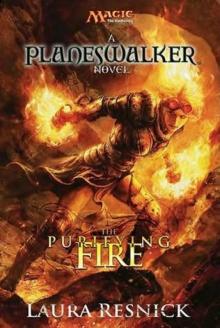 The Purifying Fire p-2
The Purifying Fire p-2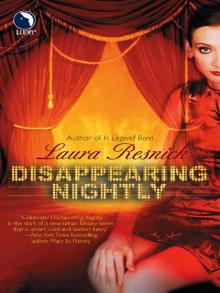 Disappearing Nightly
Disappearing Nightly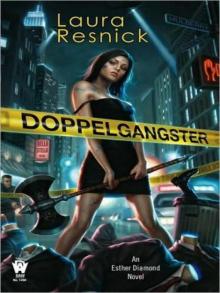 Doppelgangster
Doppelgangster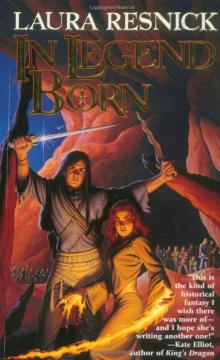 In Legend Born
In Legend Born The Destroyer Goddess
The Destroyer Goddess The Purifying Fire: A Planeswalker Novel
The Purifying Fire: A Planeswalker Novel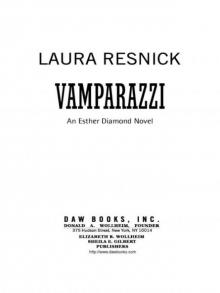 Vamparazzi
Vamparazzi A Wilder Name
A Wilder Name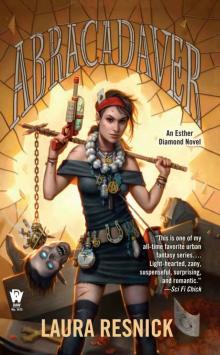 Abracadaver (Esther Diamond Novel)
Abracadaver (Esther Diamond Novel)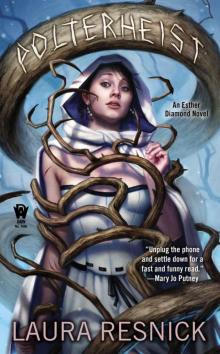 Polterheist: An Esther Diamond Novel
Polterheist: An Esther Diamond Novel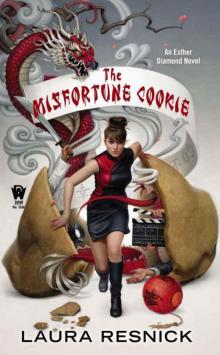 The Misfortune Cookie ed-6
The Misfortune Cookie ed-6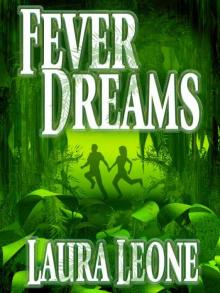 Fever Dreams
Fever Dreams The White Dragon
The White Dragon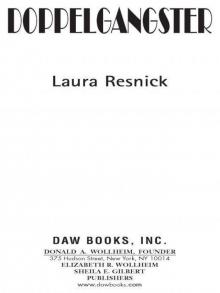 Dopplegangster
Dopplegangster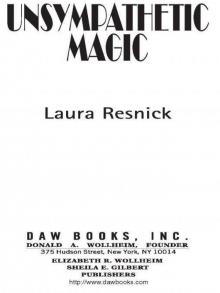 Unsympathetic Magic
Unsympathetic Magic